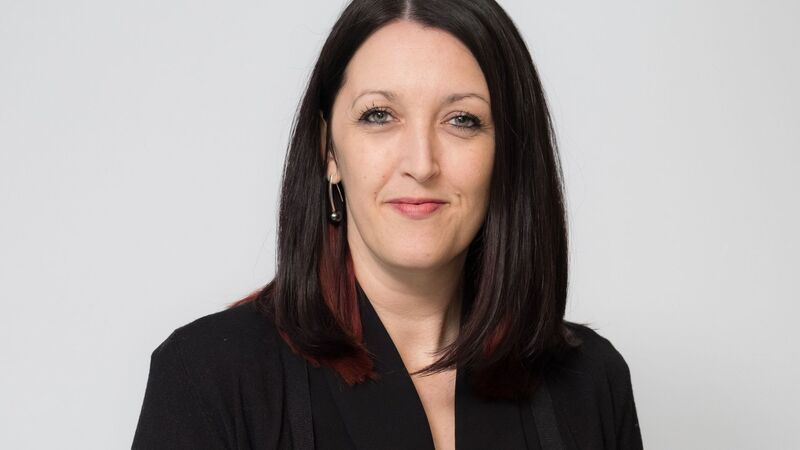You are viewing your 1 free article this month. Login to read more articles.
Structure and human connection 'critical' for home workers, FutureBook hears
Staffers are falling into “dangerous patterns” as a result of working from home during the pandemic, delegates at The Bookseller's Futurebook have heard, as a panel discussing the pitfalls and opportunities of remote working advised prioritising human connection and healthy work-life boundaries to avoid burnout.
Exploring how to navigate enforced remote working during the pandemic were panelists Sara Lloyd, digital and communications director at Pan Macmillan, Anna MacLaren May, HR director at Bonnier Books UK, Rebecca Seal, author of Solo: How to Work Alone and Not Lose Your Mind (Souvenir Press), and John Howkins, the author of Invisible Work (September Publishing). The session was chaired by The Bookseller’s Molly Flatt.
Seal (pictured), said her biggest concern was that people are on average working an extra two hours a day. “It’s unpaid work: stop doing it,” she said. “It’s critically important to understand that just because you have a gap in your day that was once filled by a commute that it doesn’t mean you should just fill it with work. One of the more worrying aspects of this year is that work is expanding into cracks in our lives where it has no right to be, because work is home and home is work and there is no dividing line between the two.”
Howkins agreed people had been “sucked into working extremely hard for long hours. I think what’s happening at the moment with the pandemic is everybody–families, households, companies–are questioning what they mean by ‘work’ as never before. What are we actually going to do all day? Is it what we want to do all day? How do we judge if we’re doing it well or badly? There’s a global conversation about what work actually is to us, in wellbeing and cultural terms.”
Structure is “incredibly important” to deal with the situation, said Seal, recognising work-life boundaries have been blurred to an even greater extent by technology, with virtual work spaces and the window to our social lives existing on the same device in our pockets.
“Unless you keep a close eye on the number of hours you’re doing, it’s impossible to know that you’re overworking in terms of what you’re being paid to do,” she said. “If you had a real life boss who said to you, ‘You must check your emails as you wake up’, ‘You must not have a lunch break, unless it is cream crackers leaning against your kitchen counter while checking your emails’ in order to keep your job, that would be a horrific way for a boss to behave. But that’s what many of us are doing to ourselves.
"Without an HR department physically present in the same building as us or a boss there to say ‘Why are you still here at eight o’ clock?’, a lot of us are falling into really dangerous patterns, so that would be my major learning from this experience: we have to watch ourselves closely, because often the schedules and routines we set for ourselves are not very healthy.”
Bonnier HR director MacLaren spoke about the importance of structure, believing it is “important to learn what works for you as an individual” as well as to keep lines of communication open.
“If you’re thinking about weeks of remote working, you need structure in order to maintain a positive mindset,” said MacLaren. “By getting into the habit of when you’re going to be available for meetings, available for your team, and taking breaks, that sets you up well for those inevitably very busy times when you may be working flat out. When you’re already in the habit of knowing you need to get out, get some fresh air, come back in again, it mitigates the risk of burning out.
“Even though it’s a simple philosophy, structure is really important and we’re going to have to work out what suits us and our particular roles; what doesn’t work is just to work flat out, thinking you can get everything done because you don’t have that commute.”
Another key learning, she shared, was that “we must all keep talking to people, focusing on others and how they’re feeling, and being available to hear how that person is” as well as to “be honest” about working practices during this unusual situation so they might be improved upon.
The importance of the personal touch has filtered down into the company’s hiring practices during the pandemic, stressing the normal protocols for new joiners, such as attending inductions and meeting colleagues, must continue as a starting point from which to evolve.“I think we all need to be highly self-aware going forward and to ensure we listen really well how people are finding both joining an organisation and working there,” said MacLaren. “We have to continue to make sure when people are new and join us to make things personal. It’s very easy to be caught up in our day remotely; we all have an obligation to make sure people feel connected and to make sure people feel part of an organisation. Then I think we’re going to have to work out how we continue to establish and evolve our individual organisational cultures.”
Lloyd, who runs a team of 40 people at Pan Macmillan, said 90% of her time was now spent in video-call meetings, a large proportion of which she chairs. Speaking about how she facilitates productive meetings on a screen, she advocated introducing greater discipline in terms of the way conversations are managed. As part of this, she said “round-the-tables”, giving airtime to every colleague present in a Zoom call, had been invaluable not only to reduce interruptions but to enable more introverted colleagues to speak up.
There also needs to be “space for informal chats that will not be as serendipitous as in the office”, she said, ultimately leaving time for better meetings. “It sounds a bit basic, but ensuring people have that free flow and that connection with each other has been so important,” said Lloyd.
Looking to what the future of work may hold, Seal cautioned that in her experience companies ought to choose whether employees are mostly based remotely or in the office, warning “a highly mixed approach” could lead to a hierarchy in which it is the “A team” in the office and a scattered “B team” working from home.
Lloyd, however, pointed to the opportunities such flexibility allows, for example for publishers keen to open up their offices to people farther away.
“I do think this is an opportunity. I don’t think we can afford to come up with very basic models and hope they’re going to work," she said. "It’s going to be about a major cultural change we need to be purposeful about… If there’s something we can do to eradicate the issue of presenteeism and ‘busy work’–for example people answering emails and feeling like they’ve done their job rather than spending their time creatively–we need to address that. We can’t just allow it to happen. This will be a huge challenge for managers and HR people alike, and leadership teams, to leverage this moment and ask how can we really take advantage of it.
"On the diversity front as well, opening up our offices to people living farther away is a massive opportunity, but, yes, we will have to define what are the core things that need to happen in the office and how often do those need to happen to allow flexibility around that. 'How many days are we in the office' is not the problem we need to solve here; the problem is ‘how do we culturally shift’. I don’t think we have all the answers yet but I think we must hold onto the positives that have come out of this period – we now need to harness those and take it forward.”

















